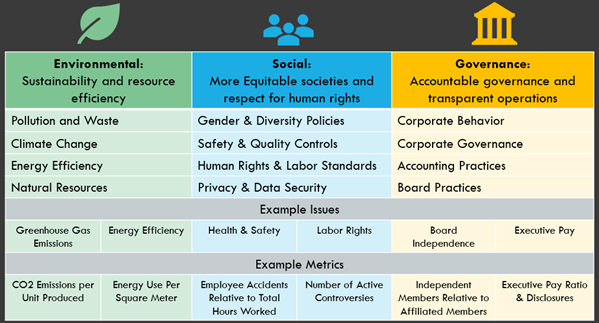ESG Impact on Organizational
Performance
" 69% of CEOs have fully embedded ESG into their business as a means of value creation".
Source: KPMG 2023 CEO Outlook.

ESG Concepts
ESG stands for Environmental, Social, and Governance, and it refers to a set of criteria that investors, businesses, and organizations use to evaluate a company's impact on society and the environment, as well as its corporate governance practices.
1. Environmental (E): This category focuses on a company's environmental impact and sustainability practices. It includes considerations such as a company's carbon footprint, energy efficiency, waste management, water usage, pollution control, and efforts to combat climate change. Companies are evaluated on their commitment to reducing.
2. Social (S): The social component of ESG assesses a company's relationships with its employees, customers, suppliers, and the communities in which it operates. Key social factors include labor practices, employee diversity and inclusion, workplace safety, human rights, community engagement, product safety, and customer satisfaction. Companies are evaluated on their commitment to fair labor practices and social responsibility.
3. Governance (G): Governance refers to the structure and practices of a company's leadership and management. It encompasses issues such as corporate ethics, board diversity, executive compensation, shareholder rights, transparency, and anti-corruption measures. Good governance ensures that a company is managed with integrity and accountability, promoting investor trust.

Impact on Organizational Performance
ESG can have a positive impact on organizational effectiveness in various ways.
1. Financial Performance: Integrating ESG practices can positively influence a company's financial performance. For example, companies with strong environmental practices may reduce operational costs through energy efficiency and waste reduction.
2. Risk Management: Effective ESG practices can help organizations identify and mitigate risks. For example, a company with strong governance practices is less likely to face legal and regulatory challenges.
3. Stakeholder Engagement: Organizations that prioritize ESG considerations tend to have better relationships with stakeholders, including investors, customers, employees, and communities. This can lead to improved organizational effectiveness.
4. Operational Efficiency: ESG practices can drive operational efficiencies by reducing waste, energy consumption, and resource use. This not only aligns with sustainability goals but also lowers operating costs and improves overall efficiency.
5. Attracting and Retaining Talents: Organizations that prioritize ESG are often more attractive to top talent. Employees are increasingly seeking employers that align with their values, and a strong ESG focus can help with talent acquisition and retention efforts..
Our ESG Solutions ->
